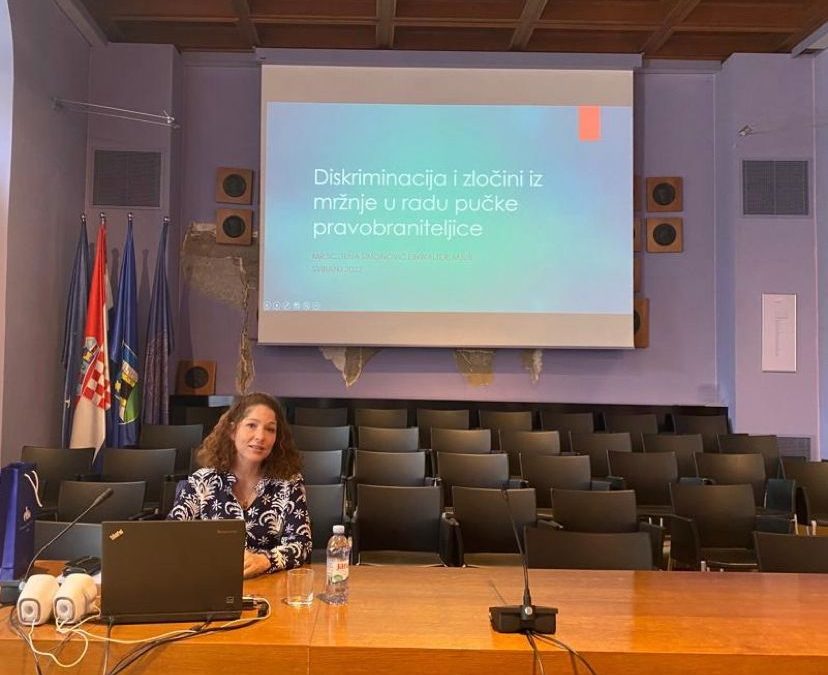Ombudswoman Tena Šimonović Einwalter’s lecture on the topic of discrimination and hate crimes from the perspective of the Croatian ombudsman institution opened this year’s ELSA (European Law Students’ Association) annual “Human Rights School”. This year’s event took place from 23 to 25 May and focused on the intersection between human rights and criminal law.
The ombudswoman’s lecture provided an overview of the legal framework defining discrimination and hate crimes (the latter are commonly motivated by various discrimination grounds, such as the victim’s race, skin color, religion, national or ethnic origin, language, disability, sex, sexual orientation, gender identity, etc.) as well as of our institution’s work on these types of cases, i.e. monitoring and investigation procedures, data collection, drafting of our annual report to the Croatian Parliament and our participation in the working group set up to monitor hate crimes in the Republic of Croatia.
Special emphasis was placed on the Protocol Regulating the Proceedings in Hate Crime Cases adopted last year. The Protocol establishes the basis for efficient data collection and provides the necessary preconditions for the effective and comprehensive work of the competent bodies participating in identifying and sanctioning hate crimes and monitoring the outcomes of court proceedings in hate crime cases with a view of improving the prevention, sanctioning and statistical monitoring of hate crimes.
Efficient statistical data collection and case monitoring is of key importance for the identification of social groups facing heightened risk for discrimination and hate crimes, which, in turn, is a necessary precondition for the creation of effective public policies aimed at preventing these types of behaviors.
Ombudswoman Šimonović Einwalter presented to the students in more detail the ECtHR’s judgement in the landmark case of Škorjanec v. Croatia. The ruling in this hate crime case stresses the failure of the competent bodies to recognize hatred as the perpetrator’s motive and, thus, to try the case as a hate crime at the national level, indicating the importance of a wider interpretation of the anti-discrimination legal framework and its legal concepts in the processing of hate crimes.
“It was my pleasure, as head of Croatian national human rights institution and equality body, to deliver the first lecture of this year’s “Human Rights School”. As a law student, 22 years ago I participated in the organization of its first edition. I am happy to see it continue to live on and educate new generations of students about human rights,” concluded the Ombudswoman.
ELSA’s “Human Rights Schools” have been taking place annually since 2001, providing the opportunity for law students to learn about various topics in the areas of human rights protection and combatting discrimination. ELSA is active in 44 European states and gathers more than 40 000 members studying in almost 300 law programs. In Croatia, the students of all four law programs performed by the Universities in Zagreb, Split, Osijek and Rijeka, are included.
A detailed analysis of the incidences of hate crimes in the Republic of Croatia is available in our 2021 Annual Report (Croatian language only).


